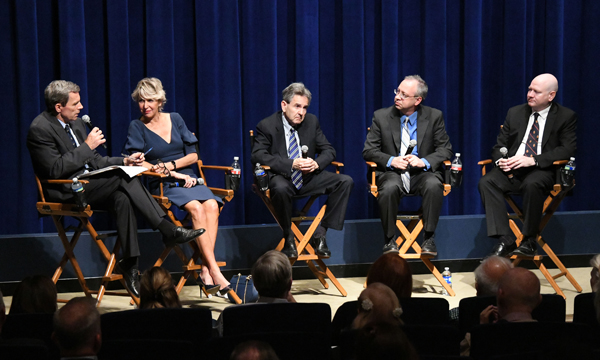 The panel included (from left) Terry McCarthy, Danielle Pletka, Robert Kaufman, Will Ruger and Daniel McCarthy.
The panel included (from left) Terry McCarthy, Danielle Pletka, Robert Kaufman, Will Ruger and Daniel McCarthy.Four panelists discussed what a conservative foreign policy for the US could look like in an era when foreign policy has become quite unpredictable. The panelists split approximately in two camps, with Daniel McCarthy, from the Fund for American Studies, and William Ruger, from the Koch Institute, largely arguing for restraint, although they rejected the label of isolationism. On the other side of the debate, Danielle Pletka, from the American Enterprise Institute, and Robert Kaufman, from Pepperdine’s School of Public Policy, pushed for a more engaged role for the US around the world, both through diplomatic outreach and military vigilance.
The debate was set up with quotes from two former Presidents – John Quincy Adams who warned Americans against “going abroad in search of monsters to destroy” and George W Bush who said, in his second inaugural speech, that US policy should have “the ultimate goal of ending tyranny in our world.”
Robert Kaufman jumped right in saying, “We didn’t go abroad seeking monsters to destroy – the monsters sought to destroy us,” [in reference to 9/11]. He said that Europe would be “very precarious” without an American military guarantee, and that although Putin’s annexation of Crimea did not equal Hitler’s 1938 annexation of Sudetenland in Czechoslovakia, the threat to Ukraine was the equivalent. Kaufman said our defense budget was historically low and was effectively “freedom insurance.”
Danielle Pletka said, “Obama posited that there are only two options when it comes to foreign policy: doing nothing or going to war. And this is wrong. In fact, doing nothing can lead to war.” But also, she said, there are a wide array of options that can help to prevent wars, and these are not necessarily policies of isolationism.
Daniel McCarthy said that “you have to make commitments that the American people support,” and added, “there is a limited amount of attention span that the American public has for political agendas.” Americans will have to accept the fact that some countries are going to make decisions that the US does not like. “The idea that we have to police the world indefinitely is a commitment that the American people will not allow.” The US, he said, should “only fight necessary wars.”
William Ruger, who advocated restraint and caution, said, “Restrainers are often called isolationists, but that is not true – we want to be more prudent but still engaging with the world.” He added that the importance of our “economic engagement with the world cannot be overstated.” But he said the lessons from Iraq, Libya and Afghanistan were clear – the US had overcommitted and failed to achieve its aims. “The nation-building project has failed.” He quoted General Stanley McChrystal who said Afghanistan had become “a bleeding ulcer.”
And while there was general support for keeping our system of alliances around the world, Robert Kaufman added in a cautionary note, “We should be careful which allies we have, because they become our biggest commitments.”
